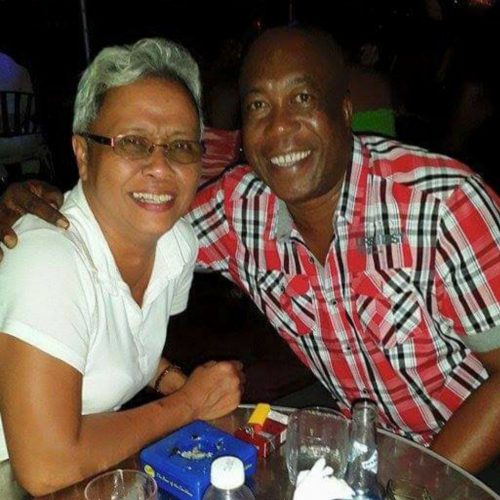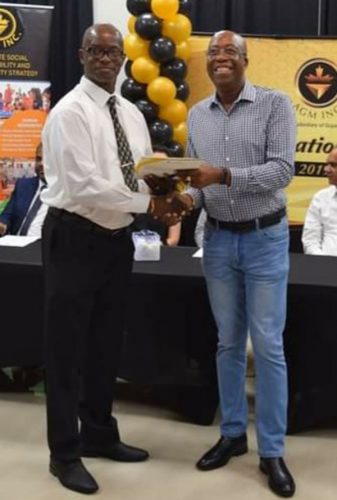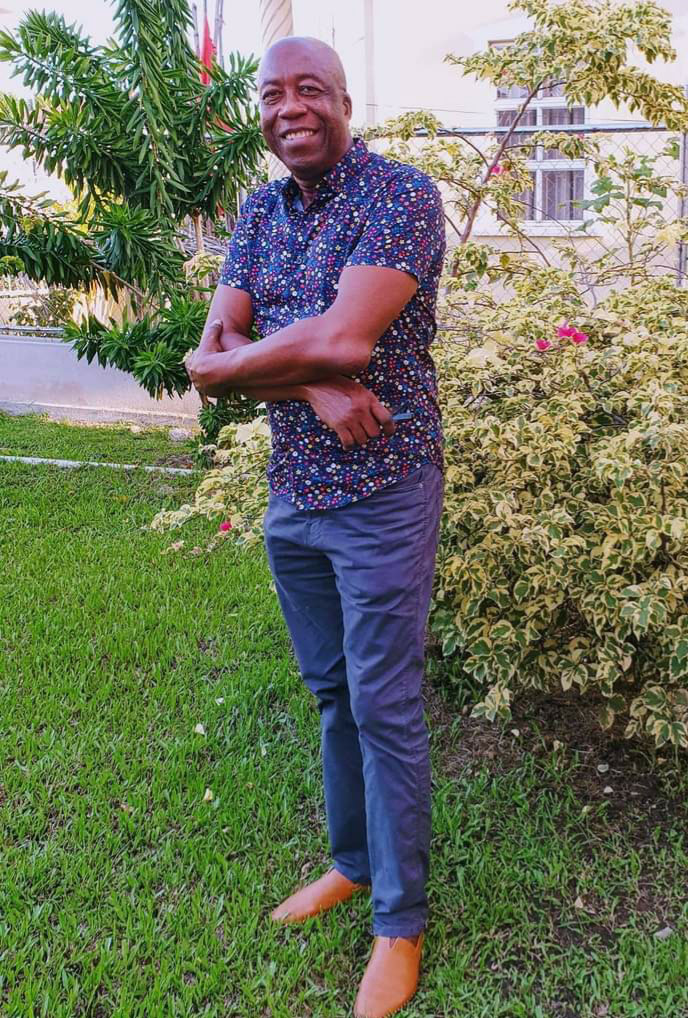Over the last four decades Peter Benny has contributed to the development of the sugar, bauxite and goldmining industries, major drivers of the economy, while developing the expertise of many Guyanese through training programmes he pioneered at every place he worked.
Currently, Director, Corporate Office, Compliance and Government Relations with the Chinese-owned AGM (Aurora Gold Mines) Inc, Benny, 64, started his professional life as a pupil teacher at Cropper Primary School. He then joined the Guyana National Service (GNS) before venturing into local government, where he had his first taste of human resources (HR) management, the love of his life. His next move was to the Guyana Sugar Corporation (GuySuCo), which grounded him in HR, before taking his skills into the goldmining industry, thereafter rotating between gold and bauxite.

“Hundreds of people who have been trained, have passed through my hands, whether it was through apprenticeship programmes at the Guyana Mining Enterprises (Guymine), Berbice Mining Enterprise (Bermine) or the training and skills development programme at Omai Bauxite, Bosai Minerals or Guyana Goldfields(GG)/AGM Inc.”
He feels “quiet pride” that his contribution has helped to structure and restructure some of those companies that made them ready to deliver on the production side. He is satisfied that he was instrumental in introducing programmes that led to the development of employees who grew into their own.

“I have given counsel to lots of managers, heads of departments in the companies, and guided expatriate general managers to be successful. I have given advice, sometimes not always that good but in the general sense, that helped to sustain employment, sustain the organisation and the image of the organisation.”
He feels disappointed sometimes, he said, when his counsel was ignored to the detriment of the organisation and the livelihood of Guyanese. “I don’t want to say, I told you so but I saw that at Bermine and even in our little setting at AGM Inc.”
In recruitment, he said, he looks at what the employee or recruit can offer then work on developing or changing his attitude. “I don’t recruit attitude, I recruit skill. Some people say that work is 95% attitude. That is after you get the skill.”
Through the Human Resources Practitioners Association, Benny worked on developing bills that became law like the Termination of Employment and Severance Pay Act, the Trades Union Recognition Act and Occupational Health and Safety Act. He worked with insurance companies to develop a health plan that GTM Group of Insurance Companies still offers.
“I would like to see insurance companies offer a more worker friendly pension scheme. I am willing to work with them to develop something like that.”
Going forward, Benny would like to have his own consultancy that is akin to the times. “I’ve been around a long time, it is time to move on to bigger things for myself.”
Early career
Benny was born in Georgetown but grew up with his grandmother in Palmyra, Berbice. As a former scout, Benny became interested in the GNS when it began penetrating the school system through the Young Brigade and the National Cadet Corps.
In January 1975, at 18 years while teaching, he joined the GNS in the second batch of trainee instructors. “I wanted the exposure because I was basically a country boy limited to my environment. My grandmother felt I was going on the wrong side of life and was happy I was going to get some disciplining.”
He was one of the trainee instructors left to man the camp at Kimbia during the GNS pioneers first Great March after which they were transferred to Papaya to complete their training.
“We built Papaya from scratch. We were 176 in strength. When we went there were only a few camps.”
After initial training he was assigned to the education department to teach national policy. At Papaya, Benny joined the GNS Culture Corps as a dramatist. He was previously an active member of the Berbice Arts Theatre in New Amsterdam.
In the GNS Culture Corps, Benny said, “I wrote the words for ‘the Black Eye Song,’ and ‘Ah we guh build Guyana, build Guyana’.” He was never credited for them.
In 1978, as the national policy teacher, he underwent a one-year training at Cuffy Ideological Training Institute, Loo Creek, when the focus was on the socialist ideology. “Lots of the guys became very political. I did not.”
However, he recalled, when he went back home, the way they were taught, he was deep into Marxism. He told his grandmother he was a Marxist and, “There was no God. She chased me out of the house. ‘You go fuh get an education and you come and tell me there is no God. Get out of here. Come back when you find God.’ I found God very quickly after that.”
An experience he never forgets is being beaten at Kimbia by the security one evening and no one was held accountable. That incident does not represent what the GNS stood for, he said.
He spent five years in the GNS before leaving as a corporal in 1980. “It was one of the best things that ever happened to me.” He returned to Palmyra.
In February, 1980 he became the chief executive officer of the Sheet Anchor/ Cumberland District Council. Later in the year he and the council fell out, “primarily because of politics.”
During the 1980 constitutional referendum, he said, the army patrolled the area to prevent any protest or rioting and their trucks damaged some culverts.
“The majority on the council was adamant that the army should pay to fix them. I questioned why, when they were doing a national duty?” He had the culverts repaired. While the council was deciding what to do about him, he had applied for a job with GuySuCo.
GuySuCo
He joined GuySuCo in December 1980 as an industrial welfare officer at Leonora Sugar Estate. “The sugar industry was vibrant. The opportunities for development was there. GuySuCo was professional at the HR management level. We worked every day but we did it in a fun way. I didn’t start HR at a university.”
When he joined Leonora Estate, Benny recalled a workers’ strike taking place at the factory by an East Indian workforce because he was “Black.” The strike served as motivation for him. He promised himself to work hard and show them he was “the right man for them and to make them like him.” Liked him they did, after he went to every funeral and wedding he could have gone to, and danced Indian dances and sang Indian songs.
His duties as industrial welfare officer included pensioners’ welfare, the dispensary (medical centre), industrial safety, the production of a weekly newsletter and inspection of “labour punts” that transported workers to the backdam.
He spent two years between Leonora and Uitvlugt.
Sports was another of his responsibilities and he worked along with Joe Solomon, former national cricketer and GuySuCo’s sports manager. He had to assist the squatting area, Groenveldt as “a lot of strikes were hatched in there.”
In 1982, based on his request, he was transferred to Rose Hall, Corentyne as the junior personnel officer, where his duties were similar to what he had in West Demerara.
There Benny learnt a lot more about HR from the administrative manager, Rupert Ross.
He completed the two-year personnel and industrial relations management training through the Institute of Distance and Continuing Education (IDCE), University of Guyana (UG), completed a six-month train-the-trainer programme with the Industrial Society of London in England and later pursued a course in the care for the elderly.
At Rose Hall, he acted a few time as personal assistant to the administrative manager in dealing with the workers’ union. Benny became active in GuySuCo’s social activities and workers welfare at every level.
He married in November 1983 and left Rose Hall in June 1984 to be the Assistant Personnel Manager at GuySuCo Training Centre, at Port Mourant.
“When I left, the intakes I had under my supervision, had some of the most outstanding grades ever with the highest numbers of distinction and credits from the Guyana Technical Education examinations.”
His stay at GuySuCo ended in his service being terminated in October 1985. “GuySuCo chairman went till up there to fire me.” To date, no one has told him why he was fired but he can only assume it was for an indiscretion. He went to New Amsterdam, now his home.
Guymine
In December, 1985, he took up a job offer as a communication assistant at Guymine even though it was not in HR.
“I worked extremely hard in bauxite knowing that I was making a contribution to the national good. Working at Guymine Berbice operations, then with Bermine, was being at home. I wanted bauxite to succeed because New Amsterdam and Kwakwani depended on it.”
Benny’s work as communications assistant “was a walkover” compared to his duties at GuySuCo. Six months later, his head of department was fired because Benny was running the show. He was promoted to communications and training officer for the Berbice operations. As a train-the-trainer, he began to design and run training programmes for supervisors and non-supervisors in writing reports and whatever was needed at the time.
He set up the first credit union at Everton and organised social activities recognising workers.
Benny once served as the secretary of the Guymine Games Committee which he said organised “The biggest sporting events ever in Guyana at Linden, running from Friday to Sunday.”
He started an in-plant apprenticeship programme at Everton that was later extended to Kwakwani.
As communications and training officer Benny acted as personnel manager for the Berbice operations in 1988. In 1989, he was confirmed as personnel manager.
In 1992, Guymine was separated into Linden Mining Enterprise (Linmine) and Bermine. Benny stayed with Bermine until 1995.
Omai Gold, cyanide spill, bauxite
Benny joined Omai in July 1995 as personnel and industrial relations superintendent.
“No one in Guyana had ever worked in a gold mine of this magnitude until Omai came. A goldmine, most times, has a life of 15 to 20 years. The only thing Guyanese can get out of it besides a very good pay, was leaving with a useful and marketable skill. I launched into training.” He had the support of the executives.
When Benny joined Omai, he said, the relationship between the union and the company was very combative. He was able to improve the working relationship between the union and the management and even the union and its membership.
“Mining was not new to me but working in a gold mine was. Omai came with its own standard and everybody had to adjust to those standards.”
Benny built on what he found and reorganised the HR department. He was required to review benefits, wages and to see wages package maintained its differential among other mining companies so that the company could retain and recruit the best skills at all times.
In doing all of that the issue of discipline was at the forefront. “I maintained a very rigid and unrepentant position on workers discipline.”
An issue affecting Omai at the time was that the price of gold was sometimes as low as $230 an ounce. The grade of the ore was at 1.5 a tonne and the management was forced to come up with strategies to bring down costs to remain competitive. The price of fuel was high.
As the company looked to continuous improvement, Benny and a colleague were sent to train overseas in two philosophies and concepts that were meant to involve all employees in bringing about an awareness on how they could contribute to reducing costs.
In August 1995, a dam to the tailings pond containing effluent was breached and while over 95% of the effluent was directed into the Fennel mining pit some went into the Omai Creek and the Essequibo River. The discoloration of the water was not due to cyanide. “It was sacrolyte, which was like red mud. When the water kept moving over the sacrolyte it changed the colour after the water mixed with it.”
His role then was to work with the health and safety department to ensure that employees working and directing effluent to the Fennel Pit, were protected. A number of workers were laid off with the right to recall while some remained in care and maintenance.
While mining was not taking place at Omai, the company, Omai Goldmine stripped and mined bauxite on contract for Linmine.
In August 2003, Omai Bauxite took control of Linmine under a management contract and Benny dealt with the administrative set up. “My job was to change the work culture and create in them a sense of ownership.”
By 2005, Cambior Inc., which owned Omai Goldmine, bought out Linmine and Benny and his team had to educate the people about Cambior’s intention.
On taking over the bauxite operations, Omai Bauxite installed in Linden, several Wartsilla generators that were at Omai and left the distribution of power to Linden Utility Cooperative.
Benny had administrative and HR responsibilities for Omai Bauxite and Omai Goldmine which was still in operation. In 2006, Iamgold Corporation bought out Cambior and took ownership of Omai Bauxite and Omai Goldmine. Iamgold sold Omai Bauxite to Bosai Minerals, a Chinese company.
Bosai
With the takeover by Bosai, Benny was responsible for all areas except the mines. On Benny’s advice, Omai Bauxite moved its management staff out of a big administrative building, into the middle of the plant in the storage area of an old building, where Bosai’s admin office remains today.
“I think I made a significant role in the rebuilding of the bauxite industry. When Omai took over in 2003 as a contractor right up to 2005, bauxite was showing a profit. That’s why Cambior bought it. Government was getting returns and we played a part in the attitudinal change, work ethics and safety practices. If you notice you don’t hear any complaints about Bosai. It is a well-run place left by me.”
He started a credit union at Omai Bauxite which is still operating under Bosai.
In 2006 Benny began his MBA at the University of the West Indies, Cave Hill travelling every other week for classes over two years while still working. In 2008 he visited Bosai’s operations in China.
Benny left Bosai in May 2009 to work with a technology company in Haiti. His stay in Haiti was short-lived after a massive earthquake hit the country and some 300,000 people died. He spent a year in Haiti and returned to Guyana.
Guyana Goldfields/AGM Inc
Benny took up his position with Guyana Goldfields in May 2010 as human resources manager with the hope that mining would start by 2011 and 2012.
“AGM Inc. only came into being when we got the mineral agreement and the investment.”
At that time his focus was on organising the workforce in a structured manner, training, and improving health and safety including eradicating malaria from its properties.
When the mine went into operation in 2015 Benny was promoted to administrative manager with responsibility for HR, supply chain and all the non-productive services.
He recruited Guyanese with experience in the industry, bringing back some from the Dominican Republic, Suriname and Africa.
One of the success stories of GG/AGM Inc, Benny said, “Is that we have the skills that we developed in mining, so that Troy Resources, First Bauxite and even ExxonMobil among others have benefitted.”
In 2019 he was appointed a director, a position he still holds under the new management of the Chinese company, Zijin Mining Group. “I am still trying to sustain a Guyanese company, which was the dream of people like Patrick Sheridan and Violet Smith—to have a gold mining company managed by Guyanese, one in which Guyanese could feel proud of.”










